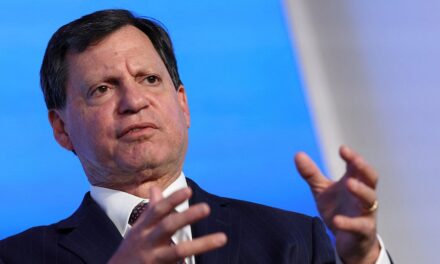In a recent opinion piece, a columnist for a prominent American newspaper has called on liberals to express their frustration regarding what they deem as broken promises by the Obama and Biden administrations. The piece has sparked discussions across social media platforms and among political analysts, who are debating the implications of such sentiments within the Democratic base.
The columnist argues that, while the Obama administration heralded a wave of hope and change, many of the commitments made during those years remain unfulfilled. This sentiment has resurfaced as many in the liberal community express dissatisfaction with President Joe Biden’s handling of various issues, including healthcare reform, climate change initiatives, and economic inequality.
Many supporters of the Democratic Party initially rallied behind President Barack Obama, uplifted by his message of progress and transformation. His presidency was viewed as a significant step forward for social justice, civil rights, and healthcare access. However, as time has gone on, critics have pointed out that several promises made during his tenure—such as comprehensive healthcare reform, tied initiatives on climate change, and comprehensive immigration reform—have largely remained unaddressed, leading to disillusionment among his supporters.
Throughout Obama’s presidency, many progressive activists pressed for more aggressive actions to tackle systemic challenges. For example, Obama’s Affordable Care Act was a monumental step towards improving healthcare access for millions. However, the reliance on private insurance companies and the retention of employer-based coverage resulted in a mixed reception among those who hoped for the introduction of a more robust single-payer system. Activists felt that rather than taking bold steps towards universal healthcare, the administration chose a more cautious approach.
The columnist also points to the Biden administration’s struggles, which many view as a continuation of the previous administration’s failings. Despite an early promise to tackle climate change aggressively, there have been concerns regarding slow progress on environmental regulations and fossil fuel dependence. Issues surrounding gun control, economic inequality, and systemic racism have also been topics of heated discussion, with progress feeling insufficient to many observers.
The article suggests that dissatisfaction with the Democratic leadership should not simply translate into apathy but rather serve as a catalyst for renewed engagement and activism. The piece insists that it is imperative for liberal constituents to hold elected officials accountable, by expressing public concern and pushing for the prioritization of progressive agendas.
For many liberal activists, the notion of getting ‘upset’ represents more than mere frustration; it is a call to mobilize and demand change. The columnist emphasizes that by voicing grievances, liberals can better shape party platforms and influence the types of policies that are ultimately pursued. It is not enough, as the article posits, for the party to assume that allegiance will remain unwavering in the face of unmet expectations.
In recent months, rising inflation and ongoing economic challenges have further complicated the Democratic agenda, causing tensions within the party. The economic fallout from the pandemic and subsequent supply chain crisis has affected public perception of Democratic leadership and eroded confidence among constituents. The frustrations experienced during these times have found their reflections in polling, indicating that voter enthusiasm may be waning ahead of the upcoming elections.
Moreover, the author urges liberals not only to express their discontent but to funnel that energy into solutions. For instance, pushing institutions to adopt bequeathing policies that concretely address climate change, wealth inequality, and social justice should be key focuses of activism moving forward. The message to the liberal base is clear: instead of accepting dissatisfaction passively, it should lead to tangible demands for change that resonate with voters and push for the systemic reforms many desired when they cast their ballots.
The piece also acknowledges that it is not merely enough to rally against the current administration; there must be a collection of progressive voices coming together to articulate a clearer, actionable vision for America’s future. The idea is for disillusioned voters to channel their energy into organizing efforts that can push local, state, and federal officials to reconsider their approaches to essential issues facing the country today.
This conversation around being ‘upset’ or calling for accountability is particularly crucial as the midterm elections approach. The effectiveness of mobilizing under such sentiments remains to be seen, but as evidenced by previous electoral cycles, public outcry can significantly reshape campaign agendas and candidate platforms.
As discussions around the article continue to evolve, it highlights a fundamental tension within the Democratic Party: the balance between maintaining unity and embracing the necessary critique of leadership. It is a delicate tightrope, as negatives within any party can often lead to divisions, yet at the same time, fostering growth and accountability is essential to maintaining a vibrant democracy.
In a historical context, the liberal movement has frequently thrived on passionate discourse and activism. While there have been successes through unified purpose, there have also been times when dissent has ultimately led to more significant achievements. This reiterates the need for ongoing discourse among party members regarding the direction of policies and priorities.
Critics of the columnist’s viewpoint argue that such dissatisfaction could bolster right-wing strengths if not managed well, potentially fracturing the coalition that rallied behind Obama and persists with Biden. The risk of voters feeling abandoned is a pressing concern, especially with the landscape shaped by global issues such as climate emergency and increasing economic struggles.
However, the call to action also resonates with many who recognize the importance of rigorous debate within governance. The voices that emerge in times of discontent could spur innovation and compel leaders to negotiate policies with a more progressive edge, ultimately leading to a broadened understanding of voters’ needs.
As the Democratic Party continues to grapple with these internal contradictions, there appears to be a growing realization that only through enduring commitment to advocacy, transparency, and accountability can the party reclaim its footing. Through expressing their distaste, liberals may find an agenda anchoring them back to the ideals that ignited their initial enthusiasm for change.
The reflections on the critical voices that instigate change are timely, prompting a reevaluation of what it means to engage in political discourse in the present era. While grievances can be a catalyst for frustration, they can also become the seed of progress if only enough people can channel their grievances into constructive pathways for action.
In conclusion, the message from the columnist is clear: the time has come for liberals to not only recognize their grievances with past and current administrations but to translate that discontent into determination. It is imperative that they mobilize to facilitate the changes they wish to see rather than silently waiting for promises to materialize. As the nation looks ahead to the elections and beyond, the push for meaningful engagement among liberal constituents could prove crucial in shaping the political landscape in the coming years.
































